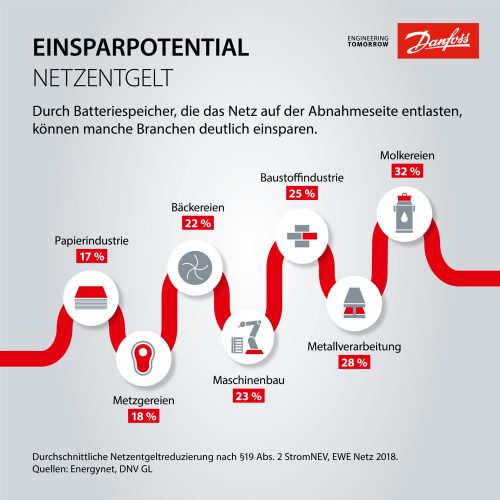On Grid, Off Grid: Green Energy for Industry
Episode 7
Hybridization in industry: What does this have to do with Rolls-Royce?
Hybrid supply strategies are gaining in importance – not only in marine applications, but also on land. Industry is increasingly relying on smart energy storage to avoid peak-load costs. Alexander Wahlig from Rolls-Royce Solutions in Berlin explains in the podcast conversation how this works, where the storage experts are implementing the projects, what distinguishes on-grid and off-grid projects from each other, how peak load strategies in industry can be driven with storage, and what the status of battery capacity is today. Damir Alihodzic of Danfoss is an expert in land-based hybridization. He is certain that the key to a green reboot lies in the flexible storage and conversion of green energy. Both experts agree that this requires converters, which form the link between battery storage and the power grid. This makes frequency converters the most important component in the hybridization project, along with the storage system itself. This closes the circle to further drive podcast episodes: The topics "DC in the industry and "OPC UA in drive technology". also play a role in hybridization projects.
Hybridization in industry: supplying production plants with green energy

Alexander Wahlig and his colleagues at Rolls-Royce Solutions develop on- and off-grid solutions worldwide as a system integrator. "On Grid" stands for projects in which engineers combine storage technologies with power supply via the general electricity grid. Off-grid applications mostly combine storage technology with a diesel generator. "This is how, for example, hotels on distant islands that cannot be supplied with diesel on a regular basis obtain their supplies," Wahlig explains.
Whereas in the past energy supply was left to the large energy service providers, today more and more companies are daring to tackle the issue themselves. New storage technologies make this possible – without jeopardizing security of supply. This is because the energy density of batteries is increasing and costs are falling. For example, companies that rely on on-grid solutions store low-cost or self-generated energy in a battery and use it when they reach their peak loads, or make the power available to the grid when it can be priced high. In addition to security of supply, this also keeps electricity costs under control.
Rethinking the market
However, Wahlig points out: "Many people in charge at companies believe that it is sufficient to set up a storage system. But intelligence and control of the systems are crucial," he explains. For this purpose, so-called micro grids have to be set up. "We need to connect a DC world, including storage, with the common AC grid so that energy can be fed in and drawn. This makes the factory both an electricity consumer and an energy supplier," says Damir Alihodzic from Danfoss. An important component in Mirco Grids is therefore converter technology. Find out how Danfoss and Rolls-Royce Solutions are jointly implementing hybridization projects in the industry in the podcast conversation.
